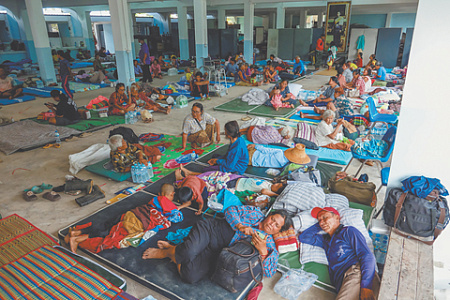
A long-simmering border dispute between Thailand and Cambodia has erupted into open military conflict, reaching a critical point with both nations employing heavy weaponry in the most significant escalation in years. Thursday’s events along the volatile frontier resembled a warzone, as Thai fighter jets conducted strikes on Cambodian positions and Cambodia responded with anti-aircraft missile systems, a development unseen in previous skirmishes between the Southeast Asian neighbors.
The fierce exchanges have already resulted in casualties. Thailand has confirmed the death of one soldier and at least 11 civilians, according to its health minister. Both countries have issued conflicting accounts, each blaming the other for initiating the hostilities. Phnom Penh stated that its troops were defending themselves against an unprovoked attack by Thai forces on their positions and nearby villages. Bangkok contends that a Thai patrol was fired upon by Cambodian soldiers, forcing it to scramble aircraft for self-defense and accusing Cambodia of a “targeted attack on civilians” with multiple rocket launcher strikes on a Thai village.
This military confrontation follows the complete collapse of diplomatic ties just a day earlier. On Wednesday, Thailand recalled its ambassador and expelled Cambodia’s top envoy from Bangkok. Cambodia swiftly reciprocated, pulling its entire diplomatic staff and ordering the Thai representative out of Phnom Penh. The diplomatic severing was triggered by an incident where a second Thai soldier lost a leg to a landmine in the contested area. Thailand blames the Cambodian government for deliberately placing the explosives, a charge Cambodia denies, attributing the mines to the legacy of past wars that ravaged the region.
The current crisis has been building steadily since a deadly clash in May. However, tensions soared following the recent leak of a phone call between then-Thai Prime Minister Phetongtarn Shinawatra and influential former Cambodian leader Hun Sen. The conversation was widely perceived in Thailand as a sign that the prime minister was prepared to make concessions on the territorial dispute. The ensuing public and political backlash led to her ousting and the rise of a more hawkish Thai leadership, apparently determined to demonstrate its resolve to the public.
At the heart of the recurring conflict is the sovereignty over several ancient temple ruins and the surrounding land, which both nations claim as their cultural and territorial heritage. Despite the severity of the latest clashes, experts believe a full-scale war remains improbable. Acting Thai Prime Minister Poomtham Wechayachai has refused to enter negotiations until “the fighting provoked by Cambodia stops,” while Cambodia’s Foreign Ministry accused Thailand of “unprovoked military aggression.”
Analysts suggest that economic realities will likely force a de-escalation. “The economies of both Cambodia and Thailand are heavily dependent on tourism, so neither is interested in a full-scale war where both sides ultimately lose,” noted Elena Fomicheva, an expert at the Center for Southeast Asia, Australia and Oceania Studies. The international community is expected to intervene, with regional bloc ASEAN, of which both are members, and neighboring powerhouse China having a vested interest in restoring stability and pressuring both sides toward a diplomatic resolution.
